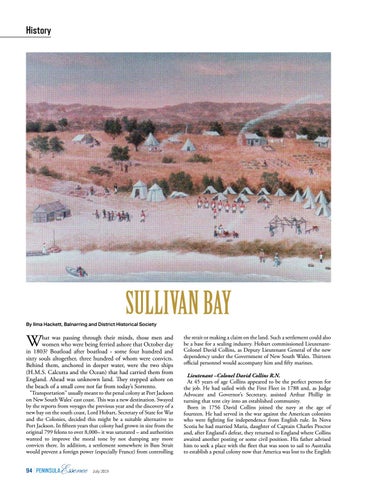History
SULLIVAN BAY
By Ilma Hackett, Balnarring and District Historical Society
W
hat was passing through their minds, those men and women who were being ferried ashore that October day in 1803? Boatload after boatload - some four hundred and sixty souls altogether, three hundred of whom were convicts. Behind them, anchored in deeper water, were the two ships (H.M.S. Calcutta and the Ocean) that had carried them from England. Ahead was unknown land. They stepped ashore on the beach of a small cove not far from today’s Sorrento.
"Transportation" usually meant to the penal colony at Port Jackson on New South Wales’ east coast. This was a new destination. Swayed by the reports from voyages the previous year and the discovery of a new bay on the south coast, Lord Hobart, Secretary of State for War and the Colonies, decided this might be a suitable alternative to Port Jackson. In fifteen years that colony had grown in size from the original 799 felons to over 8,000– it was saturated – and authorities wanted to improve the moral tone by not dumping any more convicts there. In addition, a settlement somewhere in Bass Strait would prevent a foreign power (especially France) from controlling
E ssence
94 | PENINSULA
July 2019
the strait or making a claim on the land. Such a settlement could also be a base for a sealing industry. Hobart commissioned LieutenantColonel David Collins, as Deputy Lieutenant General of the new dependency under the Government of New South Wales. Thirteen official personnel would accompany him and fifty marines. Lieutenant –Colonel David Collins R.N. At 45 years of age Collins appeared to be the perfect person for the job. He had sailed with the First Fleet in 1788 and, as Judge Advocate and Governor’s Secretary, assisted Arthur Phillip in turning that tent city into an established community. Born in 1756 David Collins joined the navy at the age of fourteen. He had served in the war against the American colonists who were fighting for independence from English rule. In Nova Scotia he had married Maria, daughter of Captain Charles Proctor and, after England’s defeat, they returned to England where Collins awaited another posting or some civil position. His father advised him to seek a place with the fleet that was soon to sail to Australia to establish a penal colony now that America was lost to the English
